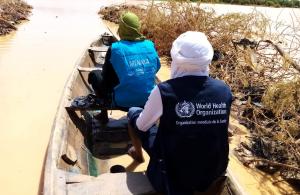No community too remote for Mali doctor
Ménaka, Mali – “A patient is a patient,” says Dr Mahamadou Diawara. “Our job is to go where people are who need health care.”
For Dr Diawara, a surgeon deployed by World Health Organization (WHO) in eastern Mali, this dedication to reaching patients anywhere has extended to many living under crisis conditions.
No community is too remote to receive the doctor’s care. Upon learning that displaced people were congregating around the village of Essakane, in the far east of Mali, Dr Diawara resolved to reach them by traversing flooded terrain in a canoe, then walking three kilometres in the sodden bush.
“By road, it was too dangerous,” he recalls, describing how he sought regular security updates from local leaders. “Eventually I was able to gain clearance from the general directorate of health to go there.”
Dr Diawara is at the forefront of the humanitarian crisis facing the country and the Sahel region at large. In recent months, clashes between armed groups have heightened insecurity in the region, causing significant population displacements.
In the Sahel, humanitarian needs due to armed conflict, drought, disease and political instability are compounded by high levels of food insecurity affecting more than 34 million people. In response, WHO has stepped up interventions in the six most affected countries, including Mali, to ensure essential health services to the populations.
In 2012, Dr Diawara and his team crisscrossed the region of Timbuktu, plagued at the time by armed clashes, to ensure that people could access vaccination services. Then, after several years in Gao, in the east of the country, Dr Diawara asked to be posted in Ménaka, a region close to the border with Niger, where more than 25 000 internally displaced people are living under precarious conditions with limited access to health care.
Trained to work in humanitarian crises, Dr Diawara and his two colleagues, an epidemiologist and a psychologist, help to strengthen early detection of epidemics, to investigate suspected cases in the field, and to analyse samples. They also help to coordinate partners' health interventions, collect and manage public health information, provide psychosocial support to displaced families, and supply medicines and health equipment to health structures in the region.
With WHO support, the four health districts of Ménaka now have mobile clinics, which have offered consultations to more than 12 000 people and made it possible to carry out routine vaccinations for more than 2000 children. WHO-trained community health workers have helped raise awareness of vaccine-preventable diseases in their communities.
“Dr Diawara was the first to come and ask us about our health needs,” recalls Outa ould Badi, a father of three living in a site for displaced people near the village of Essakane. That same day, the doctor transferred six severely malnourished children to the intensive nutrition education and recovery unit.
Trained in war surgery, Dr Diawara sometimes treats gunshot wounds and operates on appendicitis and peritonitis.
“Once, I managed to save a mother and her child by performing a caesarean section,” he says. “It was complicated, but the patient could not be evacuated because of the insecurity on the road.”
“The presence of support doctors in the areas affected by the humanitarian crisis is invaluable for the populations and makes it possible, even in a fragile context, to strengthen the health systems,” Dr Christian Itama, WHO Representative ad interim in Mali, points out.
In a few months, Dr Diawara will be able to return to Bamako, the capital, to rest for a few days and spend time with his three children after a long absence. Is he never afraid?
“Of course,” he admits. “But the main thing is to stay focused on our mission: to help people.”
WHO assistant (Library)
Email: cissea [at] who.int (cissea[at]who[dot]int)
Communication Officer
Regional Office for Africa
Email: defaitv [at] who.int (defaitv[at]who[dot]int)
Media Relations Officer
WHO Regional Office for Africa
Email: dalalm [at] who.int (dalalm[at]who[dot]int)
Tel: +254 703 245 761 (WhatsApp)



